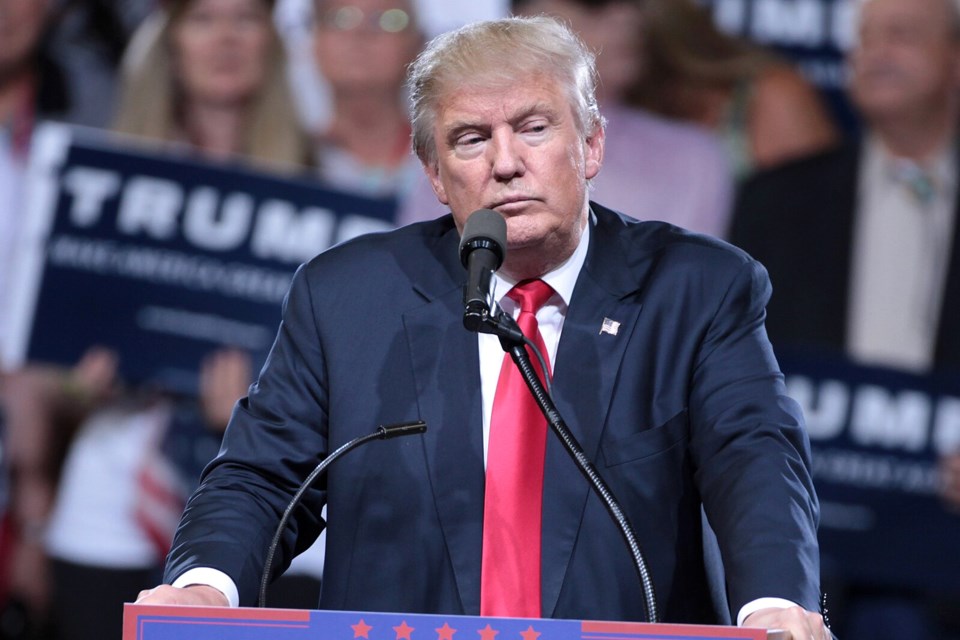Premier David Eby has never made much attempt to hide his distaste for former U.S. president Donald Trump or Trump’s particular brand of politics.
But he tried to strike a more conciliatory note on Monday, after the surprise retirement of current President Joe Biden led to a spike in the odds of another Trump presidency.
Caution seeped into the speeches at the Pacific Northwest Economic Region summit in Whistler on Monday, where talk inevitably turned to Biden’s announcement just 24 hours earlier he would not run for re-election, and instead support Vice-President Kamala Harris to take on Trump in November.
Conceding it was a “hot topic,” Eby tried to downplay the importance of an American president to British Columbia’s fortunes.
“It’s so tricky, because if we're dependent on the relationship with one individual person … I don't think we actually will be successful,” he told former journalist Hannah Thibedeau during an on-stage interview at the summit, amidst a room full of Canadian and American lawmakers and business people.
“It has to be more robust than that. It has to be much deeper than that. It has to be deeper than any one person.”
Canada’s premiers concluded the same when they met in Nova Scotia last weekend, said Eby. The group agreed to embark on a sub-national campaign to convince state governors and other local politicians of the value of a U.S.-Canadian relationship, regardless of whatever outcome is produced by the Nov. 5 U.S. elections.
Still, there’s a lot on the line for B.C.
The United States accounts for almost $36 billion in exports from British Columbia annually — 60 per cent of B.C.’s entire international trade portfolio.
Yes, there’s the traditional items, such as coal, lumber and natural gas. But those aren’t the future that the BC NDP sees for the province. Forestry is in the middle of a massive curtailment and reconciliation redraw under the NDP, while coal and natural gas don’t fit into the New Democrat climate plan.
Increasingly, B.C. sees its U.S. neighbours as big customers of its next-generation wave of export products — clean electricity, water, hydrogen fuel cells and critical minerals necessary to build batteries and solar panels.
“I can't depend on president Harris, or president Trump or (a) president like any one individual, it has to be much deeper than that, around shared goals, shared priorities and demonstrating value on both sides of the border to the relationship — which shouldn't be hard, there's huge value in this relationship,” said Eby.
Eby would only go so far as to say the prospect of “big change” in the U.S. presidency was “unnerving.”
It’s doubly unnerving for B.C. New Democrats who are watching the winds of electoral change fill the sails of the political right.
Provincially, polling puts the surging BC Conservatives in a near-tie with the NDP amongst decided voters, 12 weeks before election day.
Nationally, the federal Conservatives are trouncing the governing Liberals in popularity and appear poised to overthrow them in the next election.
And in the United States, Trump rallies a sizable voting block for a comeback, made even more likely with Biden’s departure.
Perhaps that’s why on Monday, after 19 months of throwing Trump’s name around like a four-letter word with which to disparage the surging BC Conservatives, Eby dialled it down on Monday, in the wake of Biden’s departure.
Gone was the: “John Rustad is sounding like Trump more and more everyday,” which NDP Housing Minister Ravi Kahlon posted on social media July 18.
In its place was Eby refusing to say anything critical about Trump at all, despite four questions by reporters, and two on stage at the PNWR summit.
“I think a lot of British Columbians are suffering whiplash from what's happening in terms of federal politics in the United States, and to make policy based on the daily updates from the U.S. would be a bit of a fool's errand,” he said, instead.
Whiplash indeed. Both on U.S. politics, and the NDP speaking points about U.S. politics.
Rob Shaw has spent more than 16 years covering B.C. politics, now reporting for CHEK News and writing for Glacier Media. He is the co-author of the national bestselling book A Matter of Confidence, host of the weekly podcast Political Capital, and a regular guest on CBC Radio.





